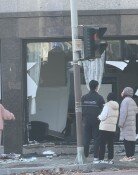Positive Signs from Stocks, Exchange Rate, and Bonds
Positive Signs from Stocks, Exchange Rate, and Bonds
Posted March. 20, 2003 22:09,
The KOSPI index rose 26.68 points or 4.92% to close at 568.46. The Kosdaq index also rose 2.37 points or 6.45% to close at 39.14.
Trading was heavy with a turnover of 2.9802 trillion won on the KOSPI index, the heaviest since January 10 when the volume stood at 3.9803 trillion won. Trading on the Kosdaq market was also heavy with a volume of 1.0946 trillion won. Advancing issues outnumbered decliners with 735 and 773 advancers and 82 and 64 decliners on the KOSPI and the Kosdaq indices respectively. The Seoul stock market was bearish with prices as well as volume rising.
Foreign investors net bought shares worth 30.2 billion won for two days and individual investors drove prices up, buying shares worth 103.7 billion won. Sell requests worth 239.7 billion won were much more than buy requests worth 122.9 billion won, but buy requests offset the difference with the expectation of an additional rise.
All industries saw their stock prices rising including financial issues that had plummeted due to SK Global`s accounting scandal and excessive overdue loan rates. Bank stocks rose by 9.42%, brokerage firms by 13.67% and insurance companies by 6.39%. Export-related issues climbed with Samsung Electronics rising by 5.24% and Hyundai Motor by 6.03%. Companies oriented towards domestic sales also witnessed their share prices rising with Shinsegae rising by 5.24% and LG Home Shopping by 5.31%.
As the aftermath of the SK Global scandal calmed, the yields edged down on the bond market. Yield on Three-year Treasury Bonds inched down 0.04 percentage points to 4.82%. Bonds issued by card companies also were traded at the yield of 7.2 percent. The trade of the card companies` bonds had almost stopped with the soaring yield of 9.2% due to a selling spree in investment trust companies.
In general, investors put their money in a safer bond market with high uncertainties in the economy while they opted for equities, expecting additional profits after uncertainties are resolved.
However, even though one uncertainty was resolved with the outbreak of the war, yield on bonds dropped rather than rose. This means there is little impact from the U.S-Iraq war. As the SK scandal was addressed, the bond markets have calmed down, Bond Market Team Manager Lee Yong-ho at the Bank of Korea said.



![[김순덕의 도발] ‘李부터 연임’ 개헌, 이 대통령은 가능성을 말했다](https://dimg.donga.com/c/138/175/90/1/wps/NEWS/IMAGE/2026/01/16/133172656.1.jpg)



